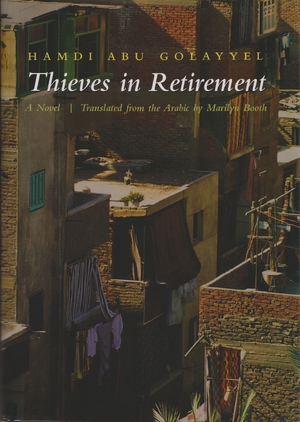"Set in a working class area of outer Cairo, it centers on the apartment house of Abu Gamal ('Father of Gamal'), a retired factory worker. . . . Abu Gamal's family grapples existentially with the building and its meanings, and their struggles take peculiarly sexualized forms: Abu Gamal's son, Gamal, is a drug-pushing womanizer; his wife prays each night to wake up as a man; a tenant, Doctoressa, tends to sexual fantasies (including Gamal's); the unnamed narrator, a Bedouin tenant unrelated to Abu Gamal, prefers masturbation and drugs to sex, due to the absolute agency they engender. Drawing knowingly on Quranic incantations and Arabic folk verse, Abu Golayyel creates a unique, absorbing idiom for the narrator. More a collection of vignettes than a consistent narrative, the novel presents a masterful collage of the ordinary extremes of Egyptian society."—Publishers Weekly
Description
Hamdi Abu Golayyel offers a striking portrait of a marginalized Egyptian community, bringing to life the absurd and tragic characters who occupy the margins of society while paying tribute to a historical Cairene neighborhood. By turns comic, reverential, beautiful, and tawdry, the novel reveals a social climate where ruthlessness and goodness seem almost indistinguishable and humanity is on display in all its rich variety.
The novelist’s distinctive vision of Egypt’s various postmonarchy political regimes and ideologies shapes this dark comedy of human relations and underground pursuits in late twentieth-century Egypt. Through intricate levels of allegory, puns, and double meanings, Abu Golayyel effectively plays on the rhetoric associated with the nationalist government of Gamal Abdel Nasser, including the post-Nasser turn toward international capitalism with its a consumer-oriented economy-and movement away from the workers’ rights orientation of the 1960s.
This novel represents a new voice and a new stage in contemporary Arabic literature, as it criticizes official ideologies, whether socialist, capitalist, or Islamist. Abu Golayyel’s cast of memorable characters embodies the arbitrariness of life and the search for purpose and dignity in a social milieu that offers little of either. Marilyn Booth’s translation fluently renders the novel’s delicate levels of diction and rhythm, making this brilliant Egyptian novel available to a much-deserved wider audience.
About the Author
Hamdi Abu Golayyel is editorial director for the Folk and Popular Culture Studies Series in the Mass/Public Culture Administration, Government of Egypt. He writes for Jaridat al-Ittihad al-Imaratiyya (Newspaper of the Emirates' Union). Hailed by critics as an important new voice, he has won three literary prizes in the region. He lives in Cairo with his wife and two daughters, Hala and Dunya.
Marilyn Booth is associate professor in the programs in Comparative and World Literature and Women and Gender Studies at the University of Illinois Urbana-Champaign. She has translated numerous works of fiction and memoir from the Arabic, including Disciples of Passion and The Tiller of Waters by Hoda Barakat and Leaves of Narcissus by Somaya Ramadan.
October 2006

